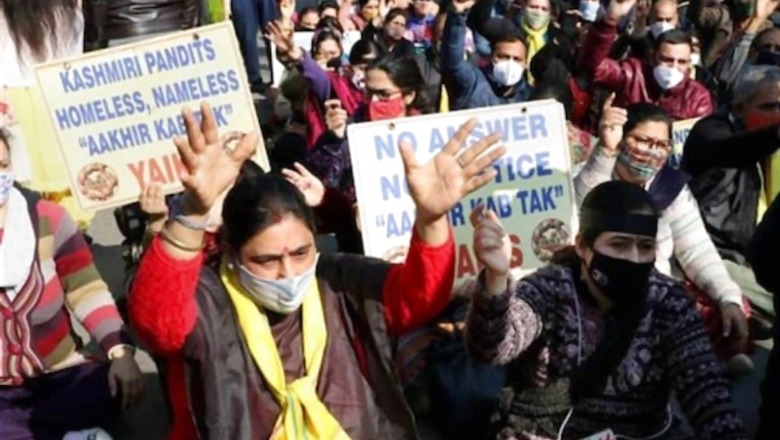OPINION | The New York Times ‘Denied’ Holocaust. Left Liberals in India Have Done the Same to Hindus

views
How many ways are there to deny that something happened? The first way is to deny the facts of what happened on the ground. This, may be argued, is the dumb way. This, for instance, is what Pakistan does. They have concocted a number of myths to “prove” that Pakistan actually won the wars in 1947-48, in 1965, in 1971 and in 1999. While such theories will always find a constituency among a small number of uninformed people, they will never be powerful enough to affect the course of global events.
The second way is deeper and more vicious. It is to take something that actually happened and then to deny the causes and the context in which it happened. Once you take a historical event and impose upon it your own made-up explanation about the motives of those who made it happen, you might as well deny the event itself.
The classic example of the latter phenomenon is what happened after the American Civil War of 1861-65. Unable to deny the fact that the Confederates lost the war, the southern states set out on a programme of elaborate deception. They argued that the cause of the Civil War was not slavery, but rights of states to decide their own laws. By imposing this revisionist approach, they managed to cast themselves as the real victims of the war. As a result, they denied rights to their black population; African Americans remained in de facto slavery and brutal racial segregation continued for another one hundred years.
As we can see, this second kind of denial is harder to beat, because it is more insidious. In the latter part of the twentieth century and thereafter, those who deny the Holocaust outright have remained, and shall forever remain, a fringe group. And thank goodness for that. But what does one make of publications such as The New York Times, which had great influence in setting global public opinion, as well as shaping attitudes within corridors of power?
Unlike the fringe, The New York Times never denied the actual concentration camps, the gas chambers, the horrors that people suffered there, nor did it try to minimize the number of victims. Instead, as a matter of policy, the publication covered up the fact that the Nazis were targeting Jews specifically because they were Jews. In The New York Times version, the concentration camps were set up to persecute citizens of the various countries that the Nazis occupied, from Poland to France to Belarus and Ukraine. The Jewish identity of those being oppressed was left out. During the famous Warsaw ghetto uprising of 1943, for instance, The New York Times covered it as citizens of Poland fighting back against the Nazis, rather than an act of Jewish Resistance. This approach of the publication continued long after the war ended, even into the 1960s. They never denied the actual atrocities, just who specifically had been targeted and why.
Unfortunately, this is where the real world consequences begin. Once you deny the identity of who suffered in the Holocaust and the two thousand years of anti-Semitism that led to it, you lose the context in which the Jewish people felt a need to have the state of Israel.
This is also where the comparisons with Indian history begin. Indian historians, almost all of them on the Left, have put in tremendous effort to deny religious persecution, forced conversions and other atrocities on Hindus during centuries of Muslim rule. They have invented various rationalizations, such as arguing that destruction of Hindu temples by Muslim rulers was due to political reasons and not religious reasons. This is exactly what The New York Times did to the Jews, arguing that the Nazis were oppressing their political enemies, not ethnically cleansing a class of people.
In recent years, there has even been an attempt to revive the reputation of Aurangzeb, making him one of the gods in India’s secular pantheon.
Once you fall for this invented history, you lose all context. You no longer see the wounds that Hindu civilization has suffered, nor do you understand the trauma of Partition. You no longer understand why so many Hindus would seek comfort in symbolic restoration by rebuilding temples at Somnath and Ayodhya. You do not understand the demographic anxieties of those facing Bangladeshi infiltration in Assam, nor those of Hindus in border regions of Bengal. All through the last two years, the liberal elite kept arguing that Assam was united in ‘secular’ opposition to the Citizenship (Amendment) Act or CAA. The election results showed that the liberal belief was comprehensively wrong.
How did Assam become a BJP stronghold? How did millions of Hindu Bengalis switch to voting for the BJP overnight? The people are trying to say something. Decrying them and their elected leaders as ‘fascists’ serve no purpose.
Once you fall for invented history, you begin to lose context in say Jammu and Kashmir. Again, the liberal elite, who borrow their worldview from Left-wing historians, have tried to paint that as purely a territorial dispute. Even more hardcore elements, acting in bad faith, have tried to explain what happened to Kashmiri Pandits in terms of class conflicts and social privilege. They insist on talking about Article 370 in terms of self-determination of a regional group, instead of a religious divide. This is similar to the approach of southern US states after the Civil War, where they made states’ rights a proxy for pushing slavery.
But the dispute in Jammu and Kashmir is grounded in religion. Pakistan understands it as such, which is why they refer to it as the unfinished business of Partition. The Pakistan-backed terrorists in Kashmir see it as such. The Kashmiri Pandit victims have experienced it as such. And when an ordinary Indian Hindu sees the conflict in Kashmir, they worry about losing yet another piece of the traditional homeland.
Interestingly, the publisher of The New York Times from 1935 to 1961, at the time the paper covered up the nature of the Holocaust, was Arthur H. Sulzberger, who was himself of Jewish origin. This is not as ironic as it sounds. Sulzberger’s priority was assimilation. And for that, if he had to deny the brutal consequences of anti-Semitism, he would do it. This is the same as the liberal elite pushing the myth of a happy Ganga-Jamuni tehzeeb, in which the ancient prejudice against “idol-worshippers” finds no mention.
As a person of Jewish origin, Sulzberger worried that his opposition to Hitler would be seen as self-serving. Just as Indian liberals, most of them drawn from Hindu society, worry that acknowledging historical wrongs suffered by Hindus will serve the cause of majoritarianism. At the same time, the publisher of The New York Times was also an ardent anti-Zionist. This is much the same as Indian liberals obsessed with fighting the imagined consequences of Hindutva.
None of this is to say that one should enable a climate of prejudice today, nor to make groups of people turn against each other. Instead, to have real harmony, we must have open and honest conversations about the past and the present. Wiping out history through intellectual coercion is a crime.
Take the case of the infamous Aryan Invasion Theory. It has long been discredited and no professional historian will say that they believe it today. But if you examine more closely, you will uncover what was really done. The term “invasion” has been officially revised to “migration” but this new term now includes everything, from the plundering by Mahmud Ghazni to the Arab conquest of Sindh. And if the idol worshippers suffered after that, it was because of political reasons and not religious ones. In other words, they never actually got rid of the idea of “invasion,” they just made the term meaningless.
This way of denying history is more insidious. Because it has large-scale consequences in real life, something that no fringe group of history deniers will ever achieve. Instead of denying the facts of history, they change the context in which it happened and the motivations of those involved. And in doing so, they manage to change everything that logically follows from that history.
Read all the Latest News, Breaking News and Coronavirus News here.


















Comments
0 comment